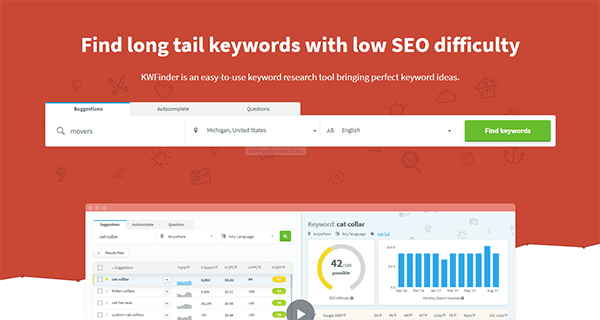What is Keyword Research? Of course, every online marketer/blogger must be aware of this.
But how effective are you with Keyword Research?
Not, much right? That’s precisely why you are reading this article right now, isn’t it?
No worries. You are at the perfect article to know the best regarding Keyword Research.
The following article is specially designed for you to understand the foundations of Keyword Research for SEO (Search Engine Optimization), covering the following sections:
Let’s now begin the article. Guess what, you are never going to regret reading this!
⇒ What is Keyword Research?
Keyword Research is a simple process of figuring out potential keywords, which could increase users’ traffic to your website. For this, you must be able to identify your target audience and figure out how they would be able to find your website.
Moreover, whenever you use a ‘Search Engine,’ like ‘Google,’ you would only search your required keyword regarding the information you need. These are the keywords of a potential search through the Internet.
Book Semrush Pro trial And grab the deal Now
Keyword research is where you will identify these specific words or phrases used on search engines, which align with your website content. This research can be used to optimize your website content and get them a better ranking on search engines.
Now, if you can understand the types of commonly searched keywords, you can use them to optimize your website, which is known as a section of SEO (Search Engine Optimization).
Once you start using specific keywords on your website, it is more likely that your website will start ranking at the top of search engines.
‘On-Page SEO’ is an accessible process, where keyword research is done on your website. With some professional examination, you will be able to get a better ranking on your website.

⇒ SEO Keyword
If you own a website, SEO Keywords will play an active role in optimizing and ranking your website on search engines. Your keywords affect the amount of traffic driven to your site.
SEO Keyword is the factor deciding the popularity of your website, ranked on several search engines on the Internet.
In essence, if you consider a blog, the major part of any article is its SEO Keyword. Without the use of SEO keywords, search engines won’t be able to trace the article efficiently.
Choose the correct SEO Keywords, and you will be able to observe potential improvements in your website user traffic. You must understand what your customers are searching for.
If you want a better ranking on search engines for your website, it is essential to focus more on your content SEO Keywords and critical phrases.
More effective SEO Keywords always have the perfect chance to get a higher ranking on search engine results, whereas ‘Google’ will be the focused search engine.
SEO Keywords are also essential to gaining organic and interactive traffic to your website. Better keywords drive traffic from search engines without any external sources, increasing organic traffic.
Read More: How To Start A Podcast – Guide For Beginners
⇒ Significance of Keyword Research
Keywords are not just about getting you suitable customers, but are way more important.

- Search Engine Ranking: Your keyword research is required to gain a better rank on search engines. With a perfect touch of keyword research, you would be able to list your website content on the primary pages of a search engine result.
- Organic Traffic: Gaining organic website traffic is a sign of successful and effective website content. Of course, there are third-party sources that can get you fake traffic, but only real traffic can develop your website’s popularity.
- Audience Engagement: Keywords are effective in driving supportive users to your site. Here, you have a higher chance of multiplying your traffic count, as these organic users have a higher opportunity to interact with your website content and even share it with other people.
- Revenue: If you are using advertisements on your website, keywords are essential. Only some proper keyword research can get you some adequate income by viewing advertisements for the users.
⇒ A Perfect Keyword Research Agenda
You can follow an effective step-by-step procedure in your website keyword process in order to achieve effective results. Given below is an agenda;
- Use an online keyword tool (keyword researcher or keyword planner) to identify potential keywords and phrases for your website content.
- Identify your website competitors and list down their names, which are also known as ‘seed words.’
- Break down the seed words to list suitable SEO keyword that relates to your website content.
- Analyze the seed words and keywords broken down from other sites (better if they are displayed on a document/spreadsheet).
- Finalize the suitable keywords to be implemented on your next website content and publish the content accordingly.
- For clarification, you could use a ‘Keyword Ranking Tool’ to measure the ranking of your specific content.
These steps could help you understand the fundamental process of figuring out your suitable keyword for content, using an efficient keyword research procedure.
Moreover, the keyword research processes are more about optimizing your website content by sticking it to the perfect categories.

⇒ Performing Keyword Research
It should always be important to make sure that your Keyword Research is useful and suited to your website content.
Initially, you could start the keyword research by questioning yourself, ‘Which topics would be searched on search engines, regarding my website content?’
Once you have the answer to the question, you are ready to begin your research.
You’d probably figure out that your content must mostly be broken into areas such as,
- Online Marketing
- Social Media Influence
- Blogs
- Website Content
Further, you can also try visiting some other websites related to your content and figure out what they are discussing. Get an idea of what other websites are focusing on related to your content.
Another fascinating method for keywords is using ‘Google Search itself. Use some keywords related to your content on Google, and you will find a whole list of suggested phrases related to your keyword. List down these phrases, break them into keywords, and use them in your content.
Additionally, there are also online ‘Keyword Tools’ to identify potential seed words related to your content. When you search the keyword, these sites will generate a list of corresponding websites related to your keyword. Use these seed words to break down the perfect keyword for your website.
In case you are worried about the keyword trends related to your website, you can use the ‘Google Trends’ page to figure out the trends of your keyword. You can measure the amount of popularity of your keyword on the Google search engine.
Further, keyword synonyms are also an effective method to increase traffic for your website. You cannot predict search engine queries precisely, so it is always practical to use keyword synonyms on your website content.
Finally, it’s all about implementing the keywords in your content. The keywords must be precisely distributed among the content, with the essential use of keyword synonyms.
For essence, if you own a blog and looking for keywords for your next article, this is the complete procedure recommended. Moreover, blog articles mostly rely on effective keywords.
Make sure to select the ideal keyword, and you will be able to get a better ranking on search engines and drive organic traffic. The more organic traffic, the more you multiply website traffic, and the more you will earn through services or website advertisements.
⇒ Keyword Planner
Yes, the essential part is about getting your website keyword planned. What is a Keyword Planner? How can Keyword Planners be used?
Keyword Planners are usually a section of Keyword Research tools, which is widely used to choose keywords for various websites.
Keyword Planners can analyze search engine websites to capture efficient keywords for your related website.

In essence, you would enter a specific keyword or phrase on the Keyword Planner, and it would search the web for similar website content and analyze the keyword efficiency.
Eventually, the Keyword Planner would also provide keyword suggestions related to your searched content. Your keyword suggestions are generated with the observation of click-through rates of potential websites.
Moreover, Keywords Planner could also be used to observe previous keyword statistics related to your specific keyword.
The most commonly used Keyword Planner is the ‘Google Keyword Planner Tool,’ which is a part of the ‘Google Ads Tool.’
⇒ Google Keyword Planner Tool
Google Keyword Planner Tool is a free section of ‘Google Ads Tool,’ designed to identify suitable keywords required and how they perform on search engines.
The Keyword Planner is used for two major purposes,
- Keywords Research: The planner can be used to find out new keywords suitable for your website content. Mostly, the planner provides additional keywords that are based on website relevance or category.
- Traffic Statistics and Forecasts: You will be able to analyze past website statistics from Google to identify the perfect keywords required for your website content. You will also be provided with click-event statistics based on the keyword, so you can figure out which topics are most viewed.
To generate keywords from the Keyword Planner, you must create a ‘Google Ads account, where you will be able to find these essential options.

Once you are on the Keyword Planner page, you can enter your required website content and obtain the suitable keywords and phrases which will be effective on your content.
Moreover, you will also be able to filter your content, to gain more accurate results. Filters such as competition search, monthly search, organic engagement, shares, ad impression, or keyword sentences, can be used to identify your ideal keywords.
Keyword Planner could also be used to trace website traffic statistics, where you will discover historical engagement details regarding your content keyword suggestions. Moreover, these keyword statistics could also be filtered date-wise for more analytical results.
If you intend to try the forecasts section of Keyword Planner, you will be able to sort your keyword results according to the change of seasons through the internet. You can also customize your forecasts according to various dates and observe how they might affect traffic.
Keyword Planner forecasts are also helpful in measuring the ‘Click-Through-Rates (CTR)’ and user impression of your website content keywords. Further, you can also analyze some popular keywords, categorized according to user location or devices.
⇒ Wrapping Up
This article covered the fundamental sections of identifying the perfect keyword for your website content. The article explained the step-by-step procedures recommended in the process of determining the ideal keyword for your website.
SEO is a section about choosing the proper method for everything. It is always essential that you have your website content optimized to increase the potential popularity of your website.
The primary goal of all websites on the internet is to achieve a better ranking on search engine pages. Website users always search using their perfect phrases, where the websites are desired to deliver them accordingly. Stay tuned for further informative articles.
⇒ Final Words
It’s time to do the right keyword research in a perfect way as guided by this article.
Do a perfect Keyword Research and make your blogs according to that in order to increase your traffic and revenue within a short time
Have a Good Day!
